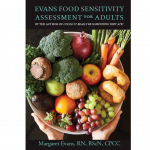
Order the Assessment!
Evans Food Sensitivity Assessment for Adults

Help! I’m Exhausted!
Are you feeling burned out and exhausted? Do you love many parts of your life yet long for a little time to yourself? Do you love your family member or friend that is ill but sometimes feel resentful of the changes their disease has imposed on your life?
Feeling overwhelmed as the caregiver of someone with a serious or chronic illness is common! The diagnosis has altered your plans for the future and you may experience a sense of sadness, anger, frustration and loss. Taking care of yourself is the secret to coping!
When you are overloaded and exhausted, you develop physical, emotional, and spiritual symptoms. If you don’t find ways to lighten your load, you may eventually experience physical and mental burnout. If you are experiencing some of the symptoms below, your stress level is too high. You need to explore ways to lighten your load!
So, what can you do?
Further Reading
« Bad Hair Days! The Healing Power of Laughter / I Love My Husband But I’m Exhausted »